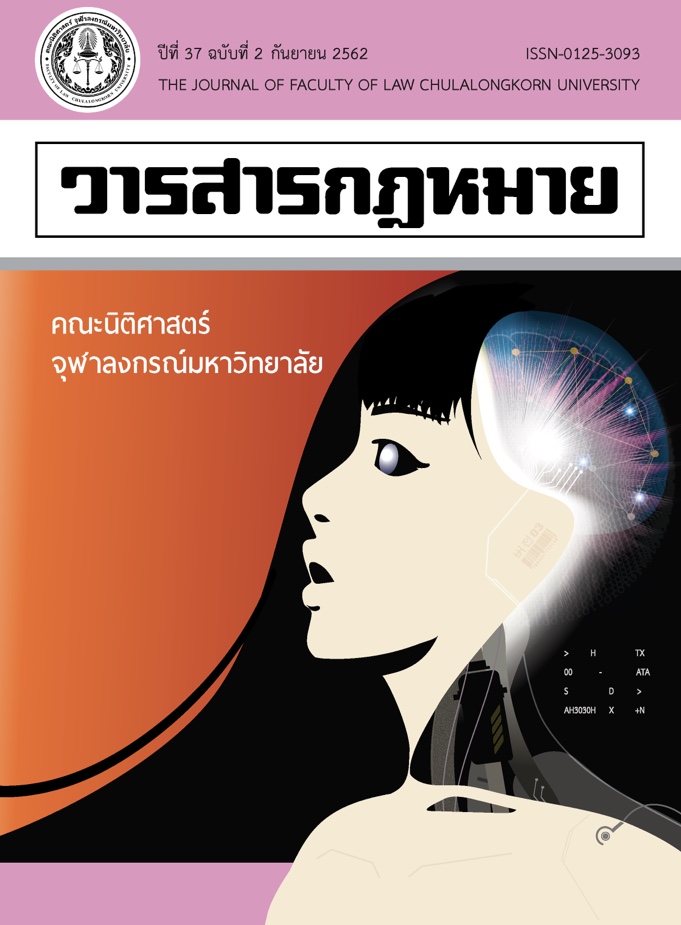Liability of Pacemaker and Defibrillator Importers Under the Product Liability Act of B.E.2551: Lessons from the United State and EU
Main Article Content
Abstract
The theme of this paper is to identify the liability of importers of defective or potentially defective pacemakers and defibrillators in Thailand. Defective lead wiring can lead to serious cardiac injury, such as arrhythmia and possible death. A shorter-than-expected life span battery or defective magnetic switch can lead to the necessity of preventive surgical operation to remove a defective pacemaker or defibrillator and to replace it with a new one. The paper discusses liability of manufacturers of these two medical devices under tort, product liability law and the Medical Device Act in the United States as it has the longest experience grappling with these problems. In the United States, stringent approval of the design by the Federal Food and Drug Administration immunizes the manufacturer from strict liability. The paper also analyses German tort law, as well as EU and German product liability laws and German Medical Device Act. Then it explores liability of importers of these two products. Finally, the paper examines relevant Thai laws, including tort law, product liability and regulatory regime of the Thai Medical Device Act. The Thai Medical Device Control Division of the Thai FDA does not perform local examination on imported pacemakers and defibrillators. The approval process is only on documentations. It concludes that Thailand should not follow the experience of the United States with regards to accidents caused by defective lead wiring, and should follow the experience of Germany with regards to interpretation of “defective” and “damage” with regards to the surgical expenses of replacing a pacemaker or defibrillator that has not malfunctioned yet.
Article Details
The copyright in this website and the material on this website (including without limitation the text, computer code, artwork, photographs, images, music, audio material, video material and audio-visual material on this website) is owned by Chulalongkorn Law Journal and its licensors.
1. Chulalongkorn Law Journal grants to you a worldwide non-exclusive royalty-free revocable license to:
- view this website and the material on this website on a computer or mobile device via a web browser;
- copy and store this website and the material on this website in your web browser cache memory; and
- print pages from this website for your use.
- All articles published by Chulalongkorn Law Journal are licensed under the Creative Commons Attribution 4.0 International License. This permits anyone to copy, redistribute, remix, transmit and adapt the work provided the original work and source is appropriately cited.
2. Chulalongkorn Law Journal does not grant you any other rights in relation to this website or the material on this website. In other words, all other rights are reserved. For the avoidance of doubt, you must not adapt, edit, change, transform, publish, republish, distribute, redistribute, broadcast, rebroadcast or show or play in public this website or the material on this website (in any form or media) without appropriately and conspicuously citing the original work and source or Chulalongkorn Law Journal prior written permission.
3. You may request permission to use the copyright materials on this website by writing to [email protected].
4. Chulalongkorn Law Journal takes the protection of its copyright very seriously. If Chulalongkorn Law Journal discovers that you have used its copyright materials in contravention of the license above, Chulalongkorn Law Journal may bring legal proceedings against you seeking monetary damages and an injunction to stop you using those materials. You could also be ordered to pay legal costs.
If you become aware of any use of Chulalongkorn Law Journal's copyright materials that contravenes or may contravene the license above or any material on the website that you believe infringes your or any other person's copyright, please report this by email to [email protected].
References
2. www.pacificbridgemedical.com/regulatory-services/medical-divice/product-registration/thailand/, visited Feb 24, 2018.
3. Maisei, WH, et.al., Pacemaker and IDC Generator malfunction: analysis of Food and Drug Administration annual reports, JAMA 2006, April 26, 295 (16): 1901-6.
4. Greenman v Yuba Motor Products 59 Cal.2d 57, 379 P2d 397, 27 Cal. Rptr. 697 (1963).
5. The Food Drug and Cosmetic Act 21 U.S.C. § 301 et seq.
6. One might ask if the United States Supreme Court could establish for all 50 states if a product is defective or not. The short answer is, no. Many complex cases are tried in federal courts under the civil procedure doctrine of “diversity jurisdiction” were all the defendants and all of the plaintiffs reside in different states. Be that as it may, the law that the federal courts under diversity jurisdiction is state, not federal law. And even then, the Supreme Court only determines questions of law, never fact, and if a product is defective is a matter or fact.
7. Marmol v. St Jude Medical Center and Pacesetter, Inc., 132 F.Supp.3d 1359, 2015.
8. Boston Scientific Madizintechnik GmBH v AOK Sachsen-An-halt-Dei Gesundheits kasse, 21 October 2014 (C-503/13)
9. Boston Scientific Madizintechnik GmBH v Betriebskrankenkasse RWE, 21 October 2014 (C-504/13)
10. Section 6 of the Thai product liability act say “… shall prove that the damage party sustained damage from the product of the entrepreneurs, and the use or storage of the product was done in a normal manner. …”
11. คำพิพากษาศาลแพ่ง คดีหมายเลขแดงที่ ผบ.4224/2557

